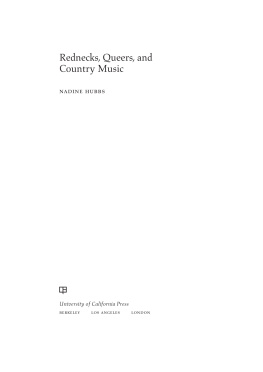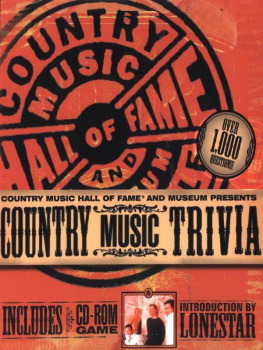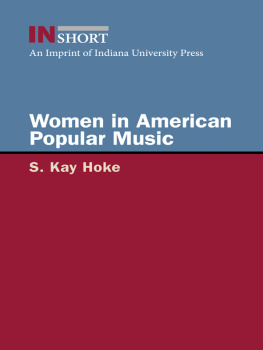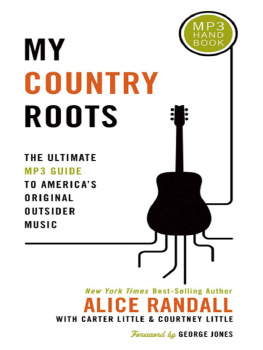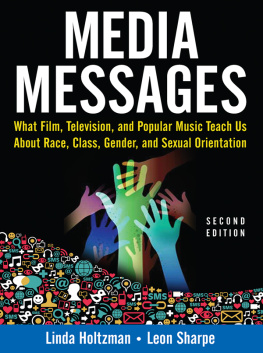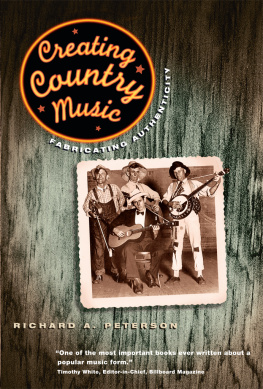Acknowledgments
I got friends that I owe is a line that resounds convincingly in Here I Am, a 1997 track by the hard-living country and roots artist Steve Earle. He continues, I aint namin names / Cuz they know. Surely my friends, like Earles, know, too. But namin names in these acknowledgments is something I have looked forward to for a long time. I relish the chance to do it now.
I am grateful to colleagues and staff in the University of Michigan Womens Studies Department for supporting me and my work and helping me to find the time and resources I needed to bring this book project to fruition. Department chairs Valerie Traub and Liz Cole, department managers Sandra Vallie and Karen Cox Diedo, and staff members Shelley Shock, Vanessa Criste, and Donna Ainsworth contributed generously and crucially to my efforts.
The Center for Lesbian and Gay Studies (CLAGS) at City University of New York provided generous support for this book through its 2009 Martin Duberman Fellowship. Important thanks go to Michigans College of Literature, Science, and the Arts (LSA) and Dean Terry McDonald for a sabbatical leave that allowed me to write full-time in fall 2011 and to LSA and the Office of the Vice Provost for Research for a Michigan Humanities Award that allowed me to write full-time in winter 2012.
From 2004 through 2013 I presented portions of this project in various venues, and I am grateful to all the audiences who inspired me with their engagement and sharpened my arguments with their critique. I am especially grateful to those who hosted, organized, and facilitated my speaking opportunities: Lisa Withers at Emory & Henry College, Kathleen Berkeley and Bill McCarthy at University of North CarolinaWilmington, Carol Boyd and Terri Eagan-Torkko at the University of Michigan Institute for Research on Women and Gender, Megan Jenkins and Richard Kramer (on separate occasions) at City University of New York Graduate Center, Rachel Maine and Inna Naroditskaya at Northwestern University, Louis Bergonzi and Bruce Carter at University of Illinois at Urbana-Champaign, Ryan Powell and John Howard at Kings College London, Sharon ODair at the University of Alabama, Robert Caserio at Pennsylvania State University, Daniel Party and Bettina Spencer at Saint Marys College, Jin Cao and Qian Wang at Fudan University, and Fangfang Gao and Adel Wang Jing at Zhejiang University. I am also indebted to those colleagues who organized conference sessions at which I presented parts of this work: Melissa De Graaf, Scott Herring, Heather Love, Jocelyn Neal, and Fred Whiting. And I am grateful for the stimulus and input of copanelists and respondents, including Michael Bertrand, Greg DeNardo, Lisa Duggan, Jen Jack Gieseking, Mary Gray, Lydia Hamessley, Scott Herring, Colin R. Johnson, Emily Kazyak, Heather Love, Kris McCusker, Jocelyn Neal, Sherry Ortner, Diane Pecknold, Ricky T. Rodrguez, Kathryn Bond Stockton, and Eric Weisbard.
This is my second book with University of California Press, and it has been gratifying to work once again with Mary Francis as my editor. I have been buoyed by Marys enthusiasm about this project since the earliest stages and by her steadfast engagement and support in our dialogues and meetings over the past decade. Kim Hogeland has been terrific as editorial assistant, keeping an eye on crucial production details and pulling things together at just the right moment. I am grateful to managing editor Kate Warne for her superb handling of the publication process and to copy editor Sheila Berg for her many improvements and elucidations.
I have received help and support from Library staff at the University of Michigan, including Womens Studies librarian Beth Strickland. Thanks to Mick Buck and Tim Davis of the Country Music Hall of Fame for searching their photo archives and providing many of the images used here. Jina B. Kim was ideal as research assistant, and this book has benefited greatly from her smart and diligent work in uploading my bibliography, locating images, and securing all the copyright permissions. I am grateful and fortunate that Phoebe Gloeckner, an amazing artist who is also an admired writer, so generously shared her time and expertise to create my authors photo.
In 200912 I worked through many of the sources and arguments of this book with sharp, musically and politically engaged Michigan undergraduates in the course Rednecks, Queers, and Country Music. A 2007 course, Uses of Trash, afforded me the special pleasure and opportunity of coteaching with my sister Jolene Hubbs. From Jolene and her work on poor whites in twentieth-century American literature and in dialogue with our students, I gained grounding and orientation that helped put this project firmly on the rails. I am deeply grateful to Valerie Traub, who as my department chair suggested both courses to me, allowed me to make them part of my teaching load, and hired Jolene, then a PhD candidate at Stanford, as my coteacher. Certain graduate and undergraduate students at Michigan contributed to this project virtually as colleagues, and I particularly thank Aaron Boalick, Grace Goudiss, Rostom Mesli, Brandon Biswas Phillips, and Emily Youatt for their input and readings.
A number of friends and colleagues spurred me on with good advice, encouragement, and sources, and I am therefore grateful to Tammy Chalogianis, Dorothy Sue Cobble, Liz Cole, Suzanne Cusick, Joe Dubiel, Lynn Eckert, LeAnn Fields, Marion Guck, Nancy Guy, Lucas Hilderbrand, Heather Love, Brenda K. Marshall, Andy Mead, Sridevi Nair, Esther Newton, Gayle Rubin, Bev Skeggs, Pavitra Sundar, Valerie Traub, and Aimee VonBokel. I am indebted, too, to colleagues and editorial readers who read parts of the manuscript at various stages and offered indispensable feedback: Sarah Banet-Weiser, Ayse Erginer, Scott Herring, Andy Mead, Karl Hagstrom Miller, Susan Siegfried, Travis Stimeling, Jessi Streib, Daniel Thomas Davis, and anonymous readers for Southern Cultures and University of California Press. I can hardly find words to express my heartfelt appreciation to those colleagues, brilliant readers all, who generously read the entire manuscript and offered expert perspective and critique: Maxime Foerster, David Halperin, Jolene Hubbs, Barry Shank, Sidonie Smith, and Valerie Traub. Liz Roberts read, edited, and provided invaluable commentary on the manuscript, the blurb, and nearly all aspects of the project. This book is better for her thoughtful attentions and astute input, and it has benefited richly from the contributions of everyone just named.

